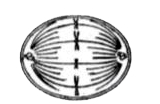What type of cell division occurs during gametogenesis of the diploid parent?
Step-by-Step Solution:
1. Understanding Gametogenesis:
- Gametogenesis is the biological process through which gametes (sperm and egg cells) are produced. These gametes are essential for sexual reproduction.
2. Types of Cell Division:
- There are two main types of cell division: mitosis and meiosis.
- Mitosis is known as equational division, where a diploid cell (2n) divides to produce two diploid daughter cells.
- Meiosis, on the other hand, consists of two sequential divisions (meiosis I and meiosis II) and is known as reductional division.
3. Mitosis Process:
- In mitosis, a diploid cell (e.g., a human cell with 46 chromosomes) duplicates its DNA during the S phase, resulting in 92 chromosomes.
- This cell then divides to produce two daughter cells, each with 46 chromosomes (diploid).
4. Meiosis Process:
- In meiosis, a diploid germ cell (2n) also undergoes DNA duplication, resulting in 92 chromosomes.
- During meiosis I, this cell divides to produce two cells, each with 46 chromosomes (still diploid).
- In meiosis II, these two cells divide again, resulting in four haploid daughter cells, each with 23 chromosomes (n).
5. Significance of Meiosis in Gametogenesis:
- For gametes to be formed correctly, they must be haploid (n). This ensures that when the sperm and egg fuse during fertilization, the resulting zygote is diploid (2n).
- Therefore, meiosis is the necessary type of cell division that occurs during gametogenesis in diploid organisms.
6. Conclusion:
- The type of cell division that occurs during gametogenesis of the diploid parent is meiosis.
---
- Gametogenesis is the biological process through which gametes (sperm and egg cells) are produced. These gametes are essential for sexual reproduction.
- There are two main types of cell division: mitosis and meiosis.
- Mitosis is known as equational division, where a diploid cell (2n) divides to produce two diploid daughter cells.
- Meiosis, on the other hand, consists of two sequential divisions (meiosis I and meiosis II) and is known as reductional division.
- In mitosis, a diploid cell (e.g., a human cell with 46 chromosomes) duplicates its DNA during the S phase, resulting in 92 chromosomes.
- This cell then divides to produce two daughter cells, each with 46 chromosomes (diploid).
- In meiosis, a diploid germ cell (2n) also undergoes DNA duplication, resulting in 92 chromosomes.
- During meiosis I, this cell divides to produce two cells, each with 46 chromosomes (still diploid).
- In meiosis II, these two cells divide again, resulting in four haploid daughter cells, each with 23 chromosomes (n).
- For gametes to be formed correctly, they must be haploid (n). This ensures that when the sperm and egg fuse during fertilization, the resulting zygote is diploid (2n).
- Therefore, meiosis is the necessary type of cell division that occurs during gametogenesis in diploid organisms.
- The type of cell division that occurs during gametogenesis of the diploid parent is meiosis.
Topper's Solved these Questions
- ANATOMY OF FLOWERING PLANTS BOOK - VMC MODULES ENGLISHCHAPTER - ANATOMY OF FLOWERING PLANTS EXERCISE - ENABLE
50 Videos
- ANATOMY OF FLOWERING PLANTS BOOK - VMC MODULES ENGLISHCHAPTER - ANATOMY OF FLOWERING PLANTS EXERCISE - EFFICIENT
49 Videos
- BIODIVERSITY AND CONSERVATIONBOOK - VMC MODULES ENGLISHCHAPTER - BIODIVERSITY AND CONSERVATIONEXERCISE - IN-CHAPTER EXERCISE-B
10 Videos
Similar Questions
Which type of cell division occurs in the gonads
View SolutionCentromeric division occurs during
View SolutionDuring spermatogenesis, the diploid cells are
View SolutionWhat is gametogenesis?
View SolutionCell growth occurs during
View SolutionThe diagram given below represents a stage during cell division
Study the same and answer the questions that follow :

Name the type of cell division that occurs during:
Replacement of old leaves by new ones.
Formation of gametes
View SolutionThe type of cell division which occurs in the cells of the reproductive organs.
View SolutionType of divisions that occurs during formation of megaspore is
View SolutionMitosis is the type of cell division occurring in the cells of injured parts of the body.
View SolutionDifferentiate between microsporogenesis and megasporogenesis. Which type of cell division occur during these events ? Name the structure formed at the end of these two events
View Solution
